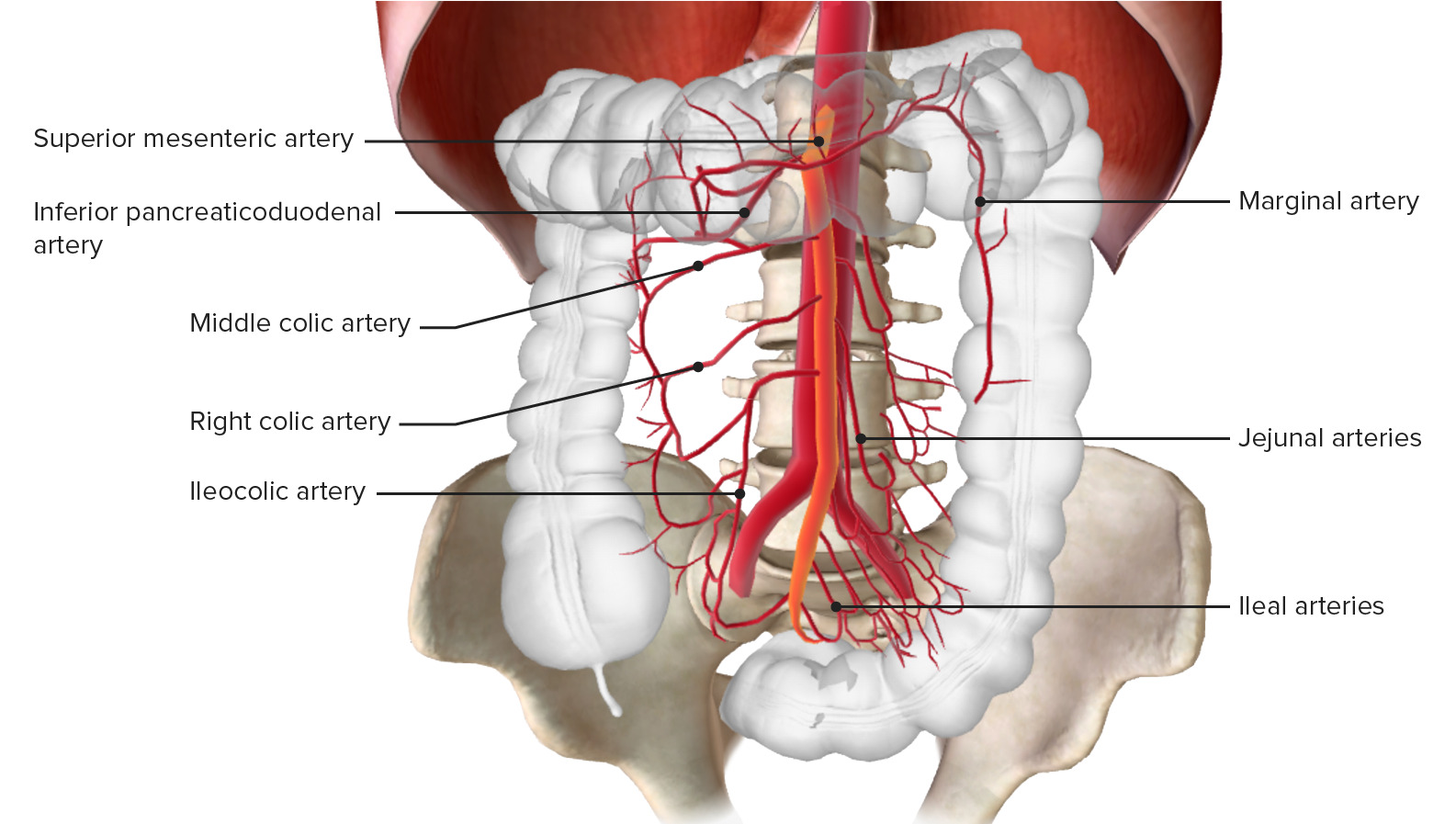Playlist
Show Playlist
Hide Playlist
Mesenteric Ischemia
-
Slides Small and large bowel.pdf
-
Download Lecture Overview
00:01 Let us now move in to greater detail about mesenteric ischemia. 00:05 This is acute mesenteric ischemia, an absolute emergency. 00:09 The patient walks in or he get a clinical vignette and you've been given an ECG. 00:14 On your ECG, take a look at your P waves or at least you try to identify them and you can´t. 00:20 They are absent or they are wavelike. 00:23 Patient here maybe approximate 65 years of age, so elderly. 00:27 At this point, you are worried about the left atrium undergoing atrial fibrillation and with this turbulence that's taking place within left atrium then this is part of Virchow's triad. Meaning to say, that it is now prone to thrombotic formation. 00:44 A thrombosis that is now developing in the left atrium becomes very dangerous, because you are worried about breaking off the thrombi and embolization destroy. 00:52 Now, I will tell you, that the embolization and the most important of embolization or the most destructive, but not the most common side of embolization. 01:04 So, a couple of things here. When we talk about cerebrovascular accident and stroke, when you have embolization from atrial fibrillation of your thrombi from the left atrium, what you are worried about and why you are giving this patient prophylactic warfarin, is so that you will prevent thrombus in left atrium secondary to atrial fibrillation. 01:25 You got all that? Now, in terms of embolization, it is not the carotid artery in which it is the number one site. It may end up in the renal artery with embolization or as our topic here brings us to SMA, which stands for super mesenteric artery. 01:43 Embolization enter super mesenteric artery acutely, will result in mesenteric ischemia. 01:49 Keep in mind that you should be hearing bowel sounds at all times within your abdomen. 01:55 And so therefore, when you have ischemia taking place gone as the bowel sound. 01:58 This is an emergency, ladies and gentlemen. Therefore, you have to then perform surgery. 02:05 The only problem is if you would then resect a large part of the intestine, then what you have left behind might not be sufficient. 02:13 Meaning to say, you have induced or created an environment of short gut syndrome. 02:19 And anytime you have a short gut, you worried about malabsorption, malabsorption, malabsorption. 02:23 This is acute mesenteric ischemia. 02:26 Do not forget about the exact story that I've given you here that most likely is going to appear in some way shall perform on your boards. 02:36 Chronic mesenteric ischemia, we called this 'intestinal angina'. 02:41 What is angina mean to you? In general, angina means that there is increase demand of oxygen by that organ and which the supply and perfusion is not met. Here we have 'intestinal'. 02:55 Associated with vascular disease and diabetes mellitus, presents with fear of eating and abdominal bruit because of decrease perfusion. 03:04 Chronic acute.
About the Lecture
The lecture Mesenteric Ischemia by Carlo Raj, MD is from the course Small and Large Intestine Diseases: Basic Principles with Carlo Raj.
Included Quiz Questions
A 65-year-old man comes to the emergency department with severe abdominal pain. He has an irregularly irregular pulse rate. An ECG confirms the absence of P waves. Which of the following would be the MOST likely cause of this presentation?
- Embolic occlusion of the mesenteric vessels
- Infarction
- Rupture of the mesenteric vessels
- Aneurysmal dilatation of the mesenteric vessels
- Inflammation of the mesenteric vessels
Which artery is commonly involved in mesenteric ischemia?
- Superior mesenteric artery
- Inferior mesenteric artery
- Celiac artery
- Lumbar artery
- Suprarenal artery
Which disease is associated with chronic mesenteric ischemia?
- Diabetes mellitus
- Scleroderma
- Sjogren's syndrome
- Reiter's syndrome
- Inflammatory bowel disease
Which classical symptom is associated with chronic mesenteric ischemia?
- Fear of eating food because it exacerbates the pain
- Pain in the midsternal region, which gets better on consumption of food
- Colicky pain in the McBurney's point not associated with consumption of food
- Colicky pain in the retroperitoneal region
- Pain radiating to the umbilicus
Customer reviews
1,0 of 5 stars
| 5 Stars |
|
0 |
| 4 Stars |
|
0 |
| 3 Stars |
|
0 |
| 2 Stars |
|
0 |
| 1 Star |
|
1 |
Guy seems cross and the lecture is lacking in context and flow




